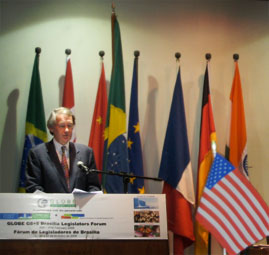
Chairman Markey at the Globe Forum in Brazil
Contact Us

Recent News
Live Copenhagen Coverage
Video available from Copenhagen includes the U.S. Delegation's press conference and network media coverage.
Click here to read more
November 17, 2009
Key Issues
Key issues at the international climate negotiations
Parties to the UNFCCC established the negotiation mandate for Copenhagen in 2007 in Bali. Known as the Bali Action Plan, this mandate focuses on four issues:
- Mitigation of heat-trapping gas emissions;
- Adaptation to the effects of global warming;
- Cooperation on technology and;
- Financing for developing countries' adaptation to and mitigation of climate change.
In addition, parties also agreed to address a shared vision for long-term cooperative action.
key issue: Mitigation
Mitigation
In the Bali Action Plan, all nations - including the United States and China - agreed to negotiate nationally-appropriate means to reduce emissions of heat-trapping gas. These actions and commitments must be measurable, reportable and verifiable. In the Bali Action Plan, developed countries agreed to help reduce emissions in those developing nations least able to afford new technologies and economic modernization. This principle of common but differentiated responsibility based on respective capabilities is likely to define the outcome of December's negotiation in Copenhagen.
key issues: Adaption
Adaptation
While we can still prevent the most dangerous consequences of climate change, some effects are already underway. For these effects, we'll need to adapt. Dealing with the effects of climate change is especially difficult for those countries most vulnerable to it: poorer nations and small island nations. Through rising sea levels and ever-more intense storms, climate change threatens the very existence of some small island states, and these nations do not always have domestic financial resources to protect themselves. As such, in the Bali Framework, developed nations agreed to help vulnerable developing nations build capacity for economic diversification, risk assessment, and disaster management among other means of building developing nations' domestic resilience to climate change. The Copenhagen negotiation will address the form of such adaptation.
Technological Cooperation
Creating a global solution to climate change requires the comprehensive deployment of existing clean energy technologies and investments in innovative research to construct a new energy economy. Greater deployment of existing technologies can reduce the link between economic production and global warming pollution and bring us much of the way to our goal of modernizing our energy economy. New technologies can enable all with access to them to transition quickly to an efficient low-carbon economy.
Given technology's central role in enabling a near-term affordable solution to climate change, UNFCCC Parties agreed on the need for accelerated development and deployment of technology for mitigation and adaptation. Cooperation on technology may appear as capacity building, research cooperation, or developed nations' funding of a technology's incremental cost for a developing country partner. Parties hold different views, however, on which concrete measures to take, which technologies to prioritize and how best to galvanize innovation. The Copenhagen negotiation should help to resolve these outstanding concerns regarding the form of technological cooperation.
Financing
Without assistance from the world's leading economies, countries without developed markets and infrastructure will not be able to mitigate their contribution to climate change or adapt to its dangerous effects. Enabling other nations to address climate change is a matter both of environmental protection and global security. As the United States' chief climate negotiator, Todd Stern, observed, "This is not charity. It is squarely in our national interest to help ensure that all countries - not simply the ones that already have the necessary infrastructure and resources at their disposal - pursue a clean development pathway... the national security threats posed by climate change are real." Negotiations in Copenhagen should clarify the scope and form of this clean development assistance.

